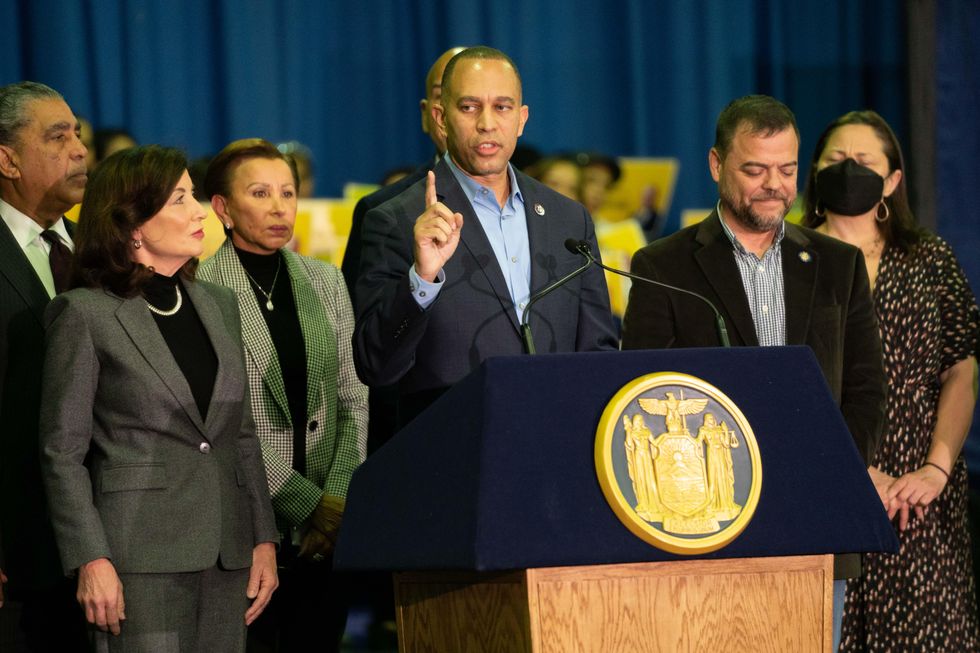
House Minority Leader Hakeem Jeffries joined New York Gov. Kathy Hochul and other state Democrats at a Bronx rally Saturday, just days ahead of what is sure to be a contentious confirmation hearing in which progressive lawmakers opposed to LaSalle’s appointment to lead the state Court of Appeals could be decided.
Progressives charge that Hector D. LaSalle is too conservative, anti-abortion, anti-labor and anti-due process and his appointment would tilt the state’s top court further to the right.
Jeffries, however, voiced his support for the judge, saying LaSalle is “highly qualified to serve as the chief judge.”
“Period, full stop,” Jeffries said.
Jeffries urged an “up-or-down” vote by the full state Senate. “It’s important for the entire New York state Senate to treat this nomination with the same dignity, decency and respect that every other nomination has received,” he said.
In December, the Democratic governor announced that she’d chosen the conservative judge as the next chief judge of the state Court of Appeals. Judge LaSalle is currently the presiding justice of the Appellate Division in Brooklyn.
The nomination was described as
“mystifying” and “horrible news” by legal experts, including public defender Eliza Orlins, who pointed to LaSalle’s record on abortion and labor rights as reasons that he was “potentially the worst of the seven nominees” the governor chose between.
The state Senate Judiciary Committee will hold a confirmation hearing on Wednesday. Progressive lawmakers are working to let the nomination die in committee without advancing it to a full Senate vote. At least 14 Democratic senators have indicated they oppose his selection.
The confirmation fight pits the moderate Hochul against the party’s progressives.
Politico reports:
Progressives and labor leaders see the pick as a betrayal after many within their ranks worked to deliver vital last-minute votes to Hochul during the final frantic days of last year’s election. Some reluctant allies are regretting their decision.
“She promised us that we would have a seat at the table,” Jimmy Mahoney, the president of a statewide iron workers union, said at the state Capitol on Monday as labor leaders rallied against the nomination. “She put us on the menu. This is not right. The way it was rolled out, it was so unprofessional and backstabbing.”Democratic leadership in the state Senate warned the newly-elected governor in early December that there would be fierce opposition to a LaSalle nomination
Common Dreamsreported last month:
LaSalle is currently the presiding justice of the New York Supreme Court’s Second Judicial Department, and as Alexander Sammon and Mark Joseph Stern
wrote at Slate, “his record as an intermediate appeals court judge demonstrates a deep hostility to the very values that Hochul claimed she wanted to uphold with this appointment.”
In 2017, LaSalle ruled that a so-called “crisis pregnancy center”—where people are pressured into carrying unwanted pregnancies instead of obtaining abortion care—should be shielded from the state attorney general’s investigation into whether the facility was practicing medicine without a license. The judge invoked the First Amendment when he ruled that “advertisements and promotional literature, brochures, and pamphlets that the [center] provided or disseminated to the public” should not be investigated.
He also joined other judges in 2015 in handing down a “shocking” opinion, Sammon and Stern wrote, that allowed Cablevision to sue union leaders for criticizing the company’s response to Hurricane Sandy, and ruled in 2014 that a criminal defendant should be blocked from appealing his conviction after the defendant claimed he’d been subjected to an illegal search.
Although Hochul claimed she was planning to nominate a chief justice who would help “defend against [the U.S.] Supreme Court’s rapid retreat from precedent and continue our march toward progress,” if LaSalle is confirmed by the state Senate to a 14-year term, he “would entrench a reactionary majority that would fight tooth and nail against the priorities of New York progressives,” wrote Sammon and Stern.




